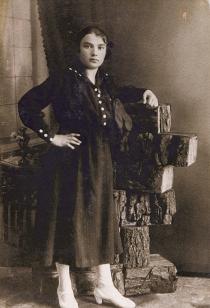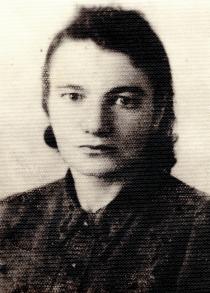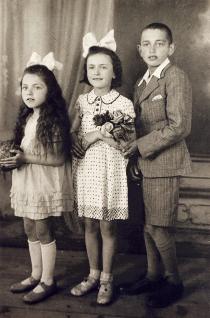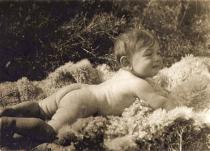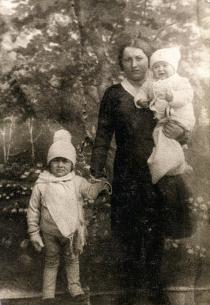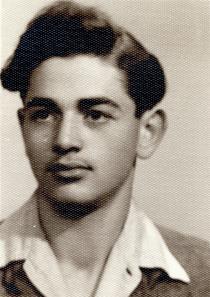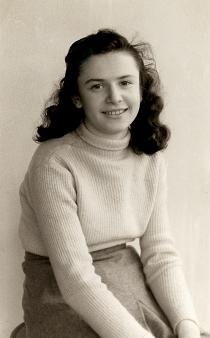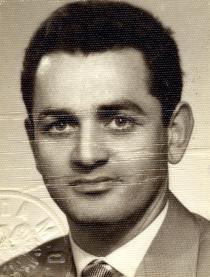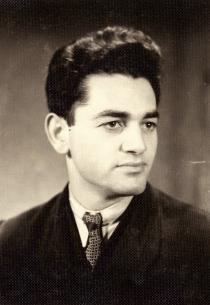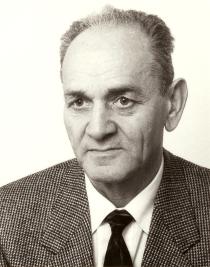This is me in my mid-30s. I can’t remember what kind of ID this photograph was taken for.
After graduation I was sent to work to the Railroad Planning Office in Cracow, on Mogilska Street. I worked there for quite a long time, a little while in the planning office, and then in the projects office, where I managed my own design projects. The work on the railroads was interesting, because I could see the communist deceit when I used to go as a supervisor to Hurko-Medyka, an iron ore trans-shipment depot from Russia to Poland. There was a gantry built there, and they tipped the ore down from the wide-gauge and loaded it into normal-gauge cars and then it was transported to Nowa Huta, and to the foundries in Silesia.
I was in a meeting, I remember, and suddenly, out of the window I saw this huge hill that had been made, all kinds of greenery was growing on it, so I asked, 'What's that big hill there?' There was this Jakubowski, who was chairing the meeting, and he signed to me to keep quiet. Later he said to me, 'Engineer, sir, that's not a hill, that's ore. We paid the Russians for it, it's in our records, but it's ore that's no use for smelting, because there's more earth in it than ore.' I came to the conclusion that I wasn't really badly off working on the railroads, but they were starting to build Nowa Huta, and I thought to myself: 'I'll go to Nowa Huta, work there a while - in industry. I was interested in the foundry itself, where the steel production, pipes, the rolling mill was, that kind of thing. I wanted to see that industry, which was so up-to-the minute for its time. Yes, I was curious.
So of course I told them my plans, filed an application for release or transfer - I can't remember. And then the boss, the director of the projects office, had me in. Engineer Domka. I say to him that it's not about the money, that I'm not trying to get anything, that I enjoyed working there - and I really did have very good relations... But I can't just carry on working like this for ever, see, I want to learn something new. And he starts explaining to me, that that office would soon be modern too. I say, 'I'm sure it will, and I wish you that… but I want it now.' And then he started on the party line, we're building socialism, this is betrayal, because I'm needed, and so on. And in this sharp tone. But I left anyway. New things are more interesting. And after that I read in the newspaper that Director Domka was arrested - the one that had given me the Stalin talk. Turns out that the railroads had all these investment projects going, and when they build new things you had to drill into the ground, do geological studies. And he'd contracted it out to some co-operative, and they'd drilled five holes, and the railroads had paid for ten, and they'd split the money. And this big Stalinist, right, went down, because he'd been mixed up in this corruption scandal - that was party people for you. That's what it was like.
I worked in the Huta foundry, but it was quite hard work, because it was day in, day out, morning to night, Sundays too, because it was all under construction. I had a gang of electricians, I was maintenance manager - it was non-stop in operation, three shifts. I worked three shifts too. The pay was out of this world. If you wrapped up a job ahead of schedule you had piles of money. But there was nowhere to spend that money. It took you an hour there and an hour back. I had night shifts, there were all sorts of emergency callouts... after a while I was absolutely exhausted. And by then I'd more or less seen everything that interested me. Anyway, I didn't have the need to earn so much because after all, I had no family, you see after the war I'd come to the conclusion that the happiest man is he who is never born. I lived with women, but I didn't want children. I had money in the bank, and I left.

